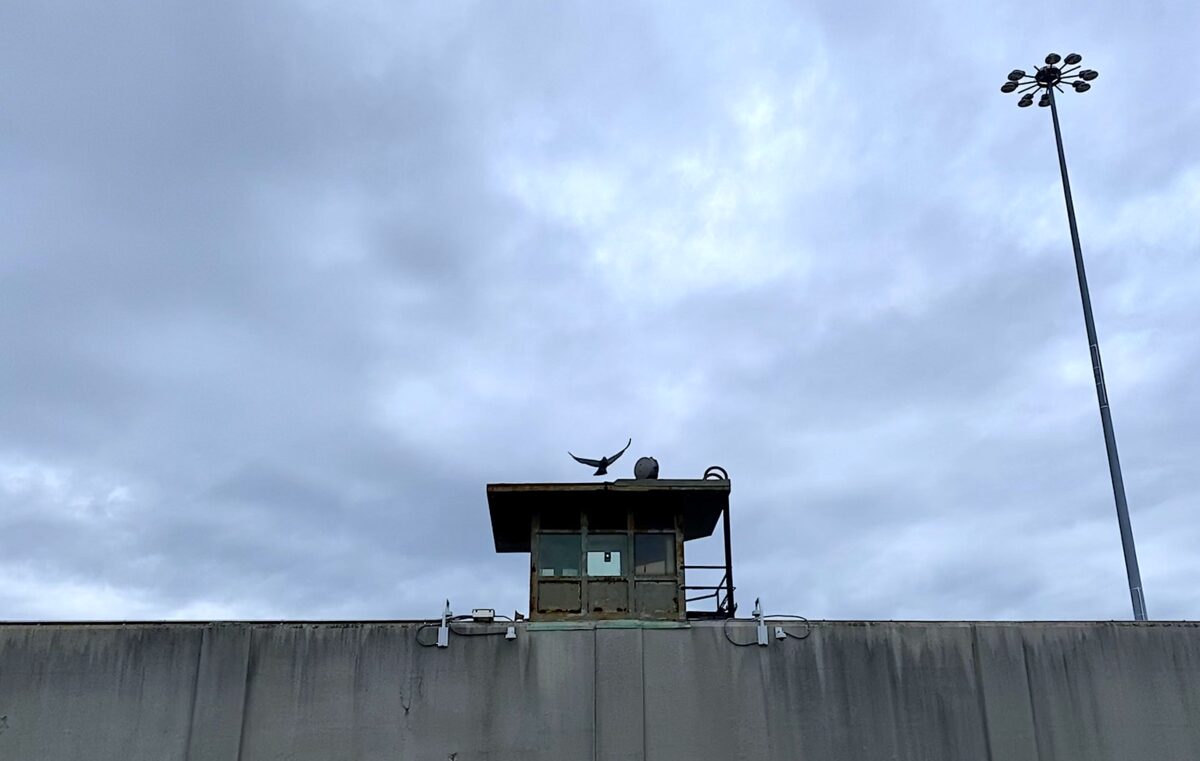On Monday, September 11, Kameron sat in the gallery of bond court, waiting for his brother to be called before Judge Barbara Dawkins. When it was his turn, Kameron stood up to show the judge his brother had family support.
Standing in bond court, Kameron, who lives in Kenwood, understood what was at stake for his brother. In 2020, a bond court judge ordered Kameron, then a defendant, to await trial in the Cook County Jail. Kameron was in jail for more than two years before being found not guilty. He was in jail when it was the largest source of COVID-19 in the country. He was in jail as his family barbecued food and children ran around while the adults played cards.
And he was innocent.
In court, Judge Dawkins set a $10,000 bond, and Kameron paid $1,000 for his brother’s freedom. “I just did twenty-five months,” he said, looking out the courthouse window onto Cook County Jail. “I’m not letting my brother stay in there.”
A week later, on September 18, Illinois became the first state to completely abolish money bond. People charged with crimes will be released if a judge determines they aren’t a flight risk or danger to the community. Money bond won’t be a condition of their release.
The reform came about as part of the passage of the Pretrial Fairness Act (PFA)—the result of sustained grassroots organizing by the Coalition to End Money Bond, which was formed in 2016 and included Southsiders Organized for Unity and Liberation (SOUL) and the Chicago Community Bond Fund in January 2021. Following a legal challenge, the PFA was upheld by the Illinois Supreme Court in July and took effect on September 18.
The week before the PFA took effect, the Weekly observed seventy-two cases in Cook County bond court for which judges ordered a total of $2,111,000 in money bail. This was a fraction of the total cases and total money bond that week. Families described how jail, paying money bond, and the possibility of release are impacting their family.
“While people see this as a change, this is actually the way it should be,” said Tanya Watkins, the executive director of SOUL. In Illinois, “people will be able to keep their jobs, stay in their homes, and maintain custody of their children while they await their trial.”
Under the PFA, not all defendants will be released. Those deemed a flight risk or danger to the community can still be held in Cook County Jail before and during their trials. Others may be released but be subject to electronic monitoring with strict limitations to their ability to leave their homes.
Families who spoke to the Weekly at bond court the week before the PFA’s abolition of cash bond took effect understand why the reform is so important—and where Illinois’s pretrial system still falls short.

On September 14, Latasha, a South Sider who was at bond court to support her husband, danced in the lobby of the Leighton Criminal Courthouse after hearing Judge Dawkins release her husband without any money bond. “I was ready to empty my savings, take out a loan, I was so scared,” she said. “Ain’t no way I [was going] to let him sit [in jail].”
As Latasha waited in court, she thought about everything she’s trying to build with her husband, who she’d married just three months ago. The couple is trying to start a family, she said.
Latasha was overjoyed that her husband was released, but said she had mixed feelings about the PFA. She supports the presumption of innocence, insisting, “If they didn’t do the crime, they shouldn’t have to pay anything.” But she also supports jailing people pretrial when they commit a “harmful crime,” especially gender-based violence and beatings.
“The practice of putting a price tag on a fellow human’s freedom is a practice that, we teach our young people, was ended long ago. Today marks the first time where we can deliver that message with honesty.”
Cook County Public Defender Sharone R. Mitchell Jr.
Madeleine Behr, the policy director of the Chicago Alliance Against Sexual Assault, said the old system of money bond didn’t make survivors of gender-based violence safe. “People could get out of jail simply because they had the money to pay, whether or not they were a danger to a survivor or the public,” Behr said. “The victim advocacy community broadly supported [the Pretrial Fairness Act]. And we helped to draft portions of this law to better protect survivors.”
In bond court, the defendants are primarily Black and Latinx. In 2021, Block Club Chicago reported that Black motorists were seven times more likely to be pulled over than white drivers. A March 2022 report by the Inspector General found that in Chicago, Black people were 1.5 times more likely to be stopped than Chicagoans overall, and after a stop, their car is more likely to be searched. WBEZ reported this week that in Chicago in 2022, Black drivers were pulled over four times as often as white drivers.
The majority of arrests the Weekly observed in bond court were initiated by police pulling over a car or creating an investigatory stop. After starting an interaction for something small—like making “wide eyed” eye-contact with police or not signaling before a right-hand turn—police searched the person and accused them of possessing a criminalized substance or a gun without complete licensing.
Darius, a South Sider, has sat in the “bullpen” holding cell crowded together with others waiting for court. He has paid money to buy his loved one’s freedom after an arrest. “It’s like a modern-day plantation,” he said.
“The practice of putting a price tag on a fellow human’s freedom is a practice that, we teach our young people, was ended long ago,” said Cook County Public Defender Sharone R. Mitchell Jr. at a press conference at the Leighton Courthouse on September 18. “Today marks the first time where we can deliver that message with honesty.”
Just outside the courtroom doors, Jennifer stood with her toddler son, who took uncertain steps up and down the hallway. Jennifer was in court to support her brother, who she said struggles with mental health and recently stopped taking his medication, starting “a bad spiral” before police arrested him.
Jennifer said that money bond is hard on families because it puts the responsibility to free a person on their loved ones. “Some people have family that can be supportive, that can get them out,” she said. But some families simply cannot pay, and some people have no family, she added. “So they’re just stuck in jail.”
From his time inside Cook County Jail, Kameron said, “You got people with substance use issues who can’t get the help they need. Putting them in jail ain’t going to help no one.” He added that jailing people who are addicted only worsens their struggles “People shouldn’t be chained up,” Kameron explained. “Because you chained up, you feel like a criminal but they just have this addiction, you know, this vice.”
Even with a supportive family with the money to buy release, it can take time to pull together thousands of dollars for a money bond. Basheer, who is currently incarcerated pretrial in Cook County Jail, said that years ago his family had to come up with a $7,500 money bond to get his nephew out. It took six weeks, but Basheer came up with $1,000 and his sister came up with $6,500. “His mom was stressed out,” Basheer said.
“Families that paid yesterday, families that paid weeks ago, they were dragged through this system unnecessarily,” Watkins told the Weekly. “Now, you look to a future where families won’t have to suffer like that.”

Outside the courtroom doors, Diamond rocked her baby girl who’s about to turn two months old. Diamond said she supports the PFA because people are in jail “for little things” just because they can’t pay the bond.
Diamond sat next to her friend, who said her godbrother “is in jail right now because he can’t pay! He has a $3,000 bond, and he can’t bond out, for something small.” She said she’s been trying to raise the money, but with bills, her toddler, and difficulty getting a loan, she couldn’t afford the bond.
Being unable to buy a loved one’s freedom can be devastating.
In one case, Judge Dawkins set an eighteen-year-old’s bond at “$125,000 D,” which means ten percent, or $12,500, was required to buy his release. The prosecutor did not request detention and the public defender said the teenager’s family only had $500, but Judge Dawkins, noting he was charged with a violent felony, still set an unaffordable money bond.
After the bond hearing, the eighteen-year-old’s mother sat outside the courtroom with tears streaming down her face. She sobbed, “That’s my baby, what am I gonna do?” After two minutes, her shaking eased, her breaths deepened, and her shoulders steadied. She walked out of the courthouse without her son.
While Kameron was in the County Jail, people were talking about the PFA. “I learned about the PFA when I was in there, in the nonviolent cases, they’re gonna be free. The ones excited is the ones with no victim on their case because they getting out. The people with a victim on their case, a violent case, it’s not going to help them.”
Kameron explained that, “I got a cousin, he in there, but he don’t have no bond. His case involves some violence. There are people in there who have the violent allegations, and they don’t have no bond at all.” Before and after the PFA, the Sheriff will jail people, like Kameron’s cousin, with “no bond” orders pretrial.
Inside, Kameron was inspired by the people around him to learn, study, and advocate for himself. He met someone who saw something in Kameron who taught him “to do the research and get stuff from the law library, get the information to social workers.” He insisted, “People got to stand up for their rights, stand up for themselves.”
Darius and Denzel came to bond court to support their brother Kevon. He was staying home on the South Side with his four month old daughter full time, so Darius and Denzel hoped for release so he can continue to raise his baby girl.
The prosecutors filed a “discretionary no bail petition” on Kevon’s case, asking the Judge to order the Sheriffs to put him in jail. Arguing for their petition, the prosecutor highlighted Kevon was found guilty of escape from electronic monitoring in 2018. Judge Dawkins granted the prosecutor’s request, jailing Kevon, and insisting “the court would have to be a fool to put this defendant on electronic monitoring, he’s already convicted of escape from electronic monitoring.”
Walking on the lakefront the next day, Darius thought back to his brother’s escape conviction. Years ago, “He broke the house arrest to go to a funeral” after the Sheriff denied his request to attend because the person who died, his life-long friend, was labeled a gang member. So Kevon broke house arrest, attended the funeral, and turned himself into the sheriff. “They didn’t mention that part.”
“I think people have better say than paper,” Darius reflected. When denying release, Judge Dawkins primarily considered Kevon’s convictions on paper. Darius reflected a more accurate understanding of a person’s safety and role in their community requires asking, “what is he striving to do now?”
In addition to abolishing money bond, the PFA creates additional opportunities to argue for pretrial release. “What I admire about the PFA is that it’s a continuous petition to not just see why you should hold [someone pretrial],” Basheer said. “It’s why you can’t find a reason for them to be out and released.”
Now, Basheer is waiting to see how this law is implemented and if evidence will be asserted or lead to release.
Today, there is no money bond in Illinois. Loved ones will go home. And, even after the PFA, many people will remain in jail. Kameron’s cousin is still in jail. Darius’ brother Kevon is still away from his baby son and will miss his daughter’s eleventh birthday.
“This is just the beginning and we still have so much work to do before an entire justice system can be called fair,” said Watkins, of SOUL. “But I hope that one day people will look back and wonder how we ever allowed the money bond system to cause so much harm for so long. And people will remember that it was Illinois who stood up and said, ‘no more.’”
Micah Clark Moody works at Civil Rights Corps where she investigates pretrial jailing systems across the country, particularly in Los Angeles. She is also a researcher who has worked as a court watcher in Cook County Bond Court.

